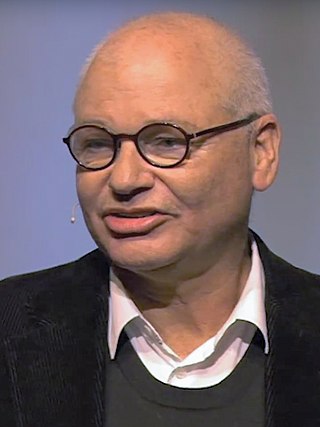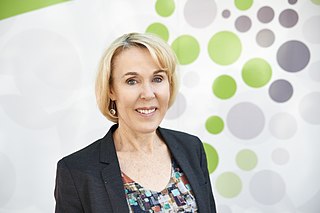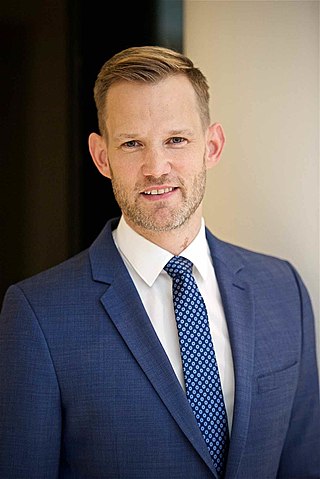Related Research Articles

Adenoviruses are medium-sized, nonenveloped viruses with an icosahedral nucleocapsid containing a double-stranded DNA genome. Their name derives from their initial isolation from human adenoids in 1953.

Tropical medicine is an interdisciplinary branch of medicine that deals with health issues that occur uniquely, are more widespread, or are more difficult to control in tropical and subtropical regions.

Jaap Goudsmit is Dutch scientist, known for his research in the field of AIDS and influenza. He shifted his research interest to aging and neurodegenerative diseases, like Alzheimer's Disease. He is also a prolific writer of non-fiction books: Viral Sex, the Nature of AIDS (1997); Viral Fitness, the Next SARS and West Nile in the Making (2004); Serendipity Manual (2012); The Vaccine Bug, a personal history of the World of Immunity (2013); Immorbidity Alphabet, Spelling-out a life free of dis-ease (2015); The Time of your Life, Staying healthy to the End (2016) and The Art of Facing Mortality, a scientist's view (2016).
Thumbi Ndung’u is a Kenyan-born HIV/AIDS researcher. He is the deputy director (Science) and a Max Planck Research Group Leader at the Africa Health Research Institute (AHRI) in Durban, South Africa. He is Professor of Infectious Diseases in the Division of Immunity and Infection, University College London. He is Professor and Victor Daitz Chair in HIV/TB Research and Scientific Director of the HIV Pathogenesis Programme (HPP) at the Nelson R. Mandela School of Medicine, University of KwaZulu-Natal. He holds the South African Research Chair in Systems Biology of HIV/AIDS. He is an Adjunct Professor of Immunology and Infectious Diseases at the Harvard T.H. Chan School of Public Health. He is the Programme Director of the Sub-Saharan African Network for TB/HIV Research Excellence (SANTHE), a research and capacity building initiative funded by the African Academy of Sciences and the Wellcome Trust.
HIV in pregnancy is the presence of an HIV/AIDS infection in a woman while she is pregnant. There is a risk of HIV transmission from mother to child in three primary situations: pregnancy, childbirth, and while breastfeeding. This topic is important because the risk of viral transmission can be significantly reduced with appropriate medical intervention, and without treatment HIV/AIDS can cause significant illness and death in both the mother and child. This is exemplified by data from The Centers for Disease Control (CDC): In the United States and Puerto Rico between the years of 2014–2017, where prenatal care is generally accessible, there were 10,257 infants in the United States and Puerto Rico who were exposed to a maternal HIV infection in utero who did not become infected and 244 exposed infants who did become infected.

Glenda Elisabeth GrayMB BCh, FC Paeds, DSc (hc), is a South African physician, scientist and activist specializing in the care of children and in HIV medicine. In 2012, she was awarded South Africa's highest honour, the Order of Mapungubwe (Silver). She became the first female president of the South African Medical Research Council in 2014, was recognized as one of the "100 Most Influential People" by Time in 2017 and was listed amongst "Africa's 50 Most Powerful Women" by Forbes Africa in 2020. Her research expertise involves developing microbicides for sexually transmitted diseases and HIV vaccines.
Almyra Oveta Fuller was an associate professor of microbiology and immunology at University of Michigan Medical School. She served as the director of the African Studies Center (ASC), faculty in the ASC STEM Initiative at the University of Michigan (U-M) and an adjunct professor at Payne Theological Seminary. Fuller was a virologist and specialized in research of Herpes simplex virus, as well as HIV/AIDS. Fuller and her research team discovered a B5 receptor, advancing the understanding of Herpes simplex virus and the cells it attacks.
Anna-Lise WilliamsonMASSAf is a Professor of Virology at the University of Cape Town. Williamson obtained her PhD from the University of the Witwatersrand in 1985. Her area of expertise is human papillomavirus, but is also known on an international level for her work in developing vaccines for HIV. These vaccines have been introduce in phase 1 of clinical trial. Williamson has published more than 120 papers.

Helen Rees OBE GCOB is a medical researcher and the founder and Executive Director of the Wits Reproductive Health and HIV Institute of the University of Witwatersrand. She has led many HIV prevention and sexual and reproductive health studies and advised on vaccination strategies to help prevent various medical conditions.
The National Institute for Communicable Diseases (NICD) is the national public health institute of South Africa, providing reference to microbiology, virology, epidemiology, surveillance and public health research to support the government's response to communicable disease threats.

Bette Korber is an American computational biologist focusing on the molecular biology and population genetics of the HIV virus that causes infection and eventually AIDS. She has contributed heavily to efforts to obtain an effective HIV vaccine. She created a database at Los Alamos National Laboratory that has enabled her to design novel mosaic HIV vaccines, one of which is currently in human testing in Africa. The database contains thousands of HIV genome sequences and related data.
Pontiano Kaleebu is a Ugandan physician, clinical immunologist, HIV/AIDS researcher, academic and medical administrator, who is the executive director of the Uganda Virus Research Institute.

Hendrik Streeck is a German researcher of human immunodeficiency virus, epidemiologist and clinical trialist. He is professor of virology and the director of the Institute of Virology and HIV Research at the University Bonn.
Hanneke Schuitemaker is a Dutch virologist, the Global Head of Viral Vaccine Discovery and Translational Medicine at Johnson & Johnson's Janssen Vaccines & Prevention, and a Professor of Virology at the Amsterdam University Medical Center of the University of Amsterdam. She has been involved in the development of Janssen's Ebola vaccine and is involved in the development of a universal flu vaccine, HIV vaccine, RSV vaccine and COVID-19 vaccine.
Fred Mhalu is a microbiologist and medical researcher from Tanzania. His main area of study revolves around infectious diseases and intervention. Ever since 1986, he has been a main contributor to the information about AIDS in Africa. As a co-coordinator of a Tanzanian-Swedish research collaboration called TANSWED, he was involved in many research projects that lead to multiple publications in medical journals. His more recent research on HIV/AIDS involves studying breast cancer in HIV prevalent areas, evaluating prevention of mother-to-child-transmission of HIV-1, and observing sexual behaviors of high risk populations for HIV-1.

Wei-Shau Hu is an American geneticist specialized in HIV research, retroviral recombination, RNA packaging, and virus assembly. She is a senior investigator at the National Cancer Institute and head of the viral recombination section. She was an associate professor at West Virginia University.

Shabir Ahmed Madhi is a South African physician who is professor of vaccinology and director of the South African Medical Research Council Respiratory and Meningeal Pathogens Research Unit at the University of the Witwatersrand, and National Research Foundation/Department of Science and Technology Research Chair in Vaccine Preventable Diseases. In January 2021, he was appointed Dean of the Faculty of Health Sciences at the University of the Witwateratand.
Penelope Moore is a virologist and DST/NRF South African Research Chair of Virus-Host Dynamics at the University of the Witwatersrand in Johannesburg, South Africa and Senior Scientist at the National Institute for Communicable Diseases.
Barry Schoub is a South African medical virologist known for his work in medical virology research. At the age of 33 he became the first Professor and Head of the Department of Virology at University of the Witwatersrand. He was the founding Director of the National Institute for Communicable Diseases (NICD) of South Africa, serving as Executive Director between 2002 and 2011. He chairs South Africa's Ministerial Advisory Committee on COVID-19 vaccines (VMAC). He was also the founding president of the African Virology Association, chaired the Scientific Advisory Panel of the Poliomyelitis Research Foundation and served on the Scientific Advisory Committee of the South African AIDS Vaccine Initiative. Commenting on the importance of lessons learnt from the Covid-19 vaccines, Schoub said that there is a need “for early recognition and immediate epidemic control of emerging infectious diseases.” He continued, saying that “International health cooperation and its facilitation, which has to be free of political interference, is a priority and an imperative. Provisions must be made for a global infrastructure for rapid vaccine manufacture and distribution to all parts of the world. Now may well be the time to plan for a future in which vaccines are not treated as commercial commodities but as essential prevention instruments to benefit the health of everyone on the planet.” He was awarded the Order of Mapungubwe by the State President in 2012.
Julie M. Overbaugh is an American virologist. She is a professor at the Fred Hutchinson Cancer Research Center. Overbaugh is best known for her translational approach to studying HIV transmission and pathogenesis and studies of how the antibody response evolves to recognize viruses. Her work in maternal and infant HIV transmission helped make clear the risk posed by breastfeeding and highlighted unique characteristics of an infant immune response that could inform vaccine development. Major scientific contributions to the understanding of HIV transmission and pathogenesis also include: identifying a bottleneck that selects one or a few variants during HIV transmission; demonstrating the importance of female hormones in HIV infection risk; showing the HIV reinfection is common; demonstrating a role for antibodies that mediate ADCC in clinical disease; showing that HIV infected infants develop unique neutralizing antibody responses to HIV.
References
- ↑ Etheredge, Harriet Rosanne; Fabian, June; Duncan, Mary; Conradie, Francesca; Tiemessen, Caroline; Botha, Jean (2019). "Needs must: living donor liver transplantation from an HIV-positive mother to her HIV-negative child in Johannesburg, South Africa". Journal of Medical Ethics. BMJ. 45 (5): 287–290. doi: 10.1136/medethics-2018-105216 . ISSN 0306-6800. PMC 6582740 . PMID 31085631.
- ↑ "The Defectiveness of the Subgroup F Adenoviruses in vitro (A thesis submitted to the Faculty of Medicine)" (PDF). University of the Witwatersrand. 1992.
- 1 2 3 4 "2019-09 - A moment with Professor Caroline Tiemessen". Wits University. 4 September 2019. Retrieved 28 August 2020.
- ↑ "Centre for HIV and STIs". National Institute for Communicable Diseases. Archived from the original on 10 February 2020. Retrieved 28 August 2020.
- 1 2 3 4 5 6 "Caroline Tiemessen". virology-education. Archived from the original on 30 July 2019. Retrieved 28 August 2020.
- ↑ "Wits lecture". Understanding natural immunity to HIV. 29 September 2011. Retrieved 28 August 2020.
- ↑ "Wits scientists working towards neutralising HIV". health-e.org. 8 November 2011. Archived from the original on 30 July 2019. Retrieved 28 August 2020.
- 1 2 3 Boseley, Sarah (24 July 2017). "Child treated for HIV at birth is healthy nine years on without further treatment". The Guardian . Retrieved 28 August 2020.
- ↑ Kuhn, Louise (1 May 2015). "Latency and Early Neonatal Provision of Antiretroviral Drugs Clinical Trial - Full Text View". ClinicalTrials.gov. Retrieved 28 August 2020.
- ↑ "SA child living with HIV maintains remission without ARVs since 2008". medicalxpress. 26 July 2017. Archived from the original on 30 July 2019. Retrieved 28 August 2020.
- ↑ "Academy of Science of South Africa - Members - T". Academy of Science of South Africa . Retrieved 28 August 2020.
- ↑ "2018-04 - Wits University". Wits University. 2 April 2018. Retrieved 28 August 2020.
- ↑ "National Institute for Communicable Diseases Annual Report 2018/19" (PDF). NICD. p. 68.
- ↑ "Prof Caroline Tiemessen - 2019 - Gold". SAMRC. Retrieved 28 August 2020.